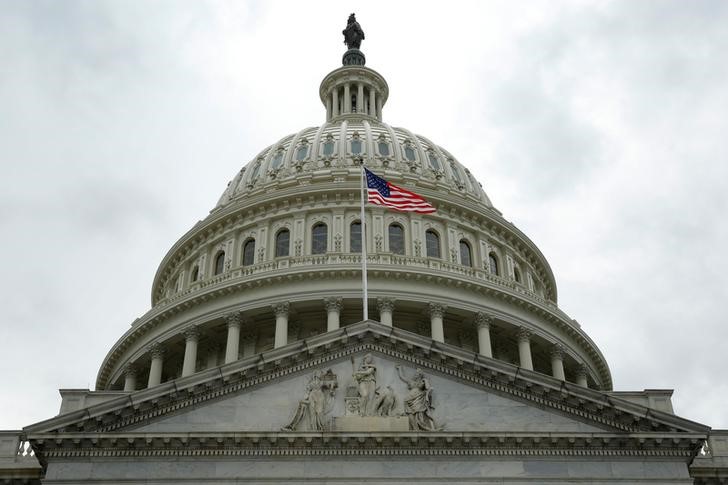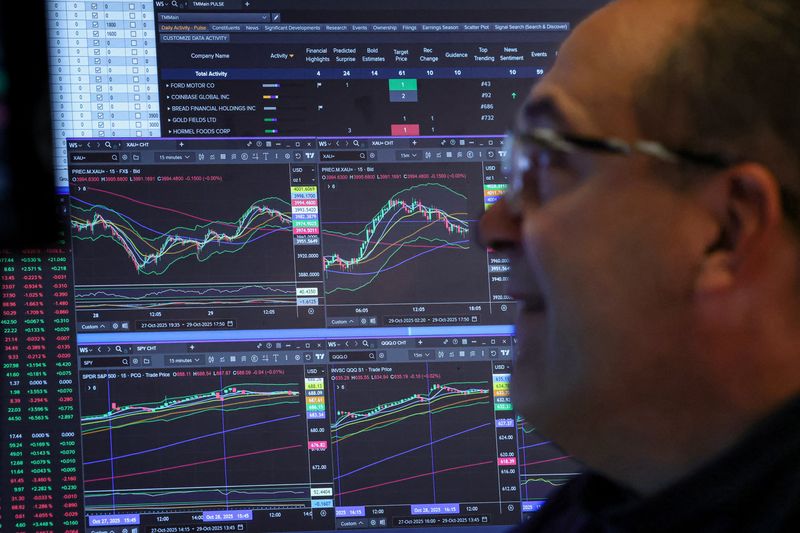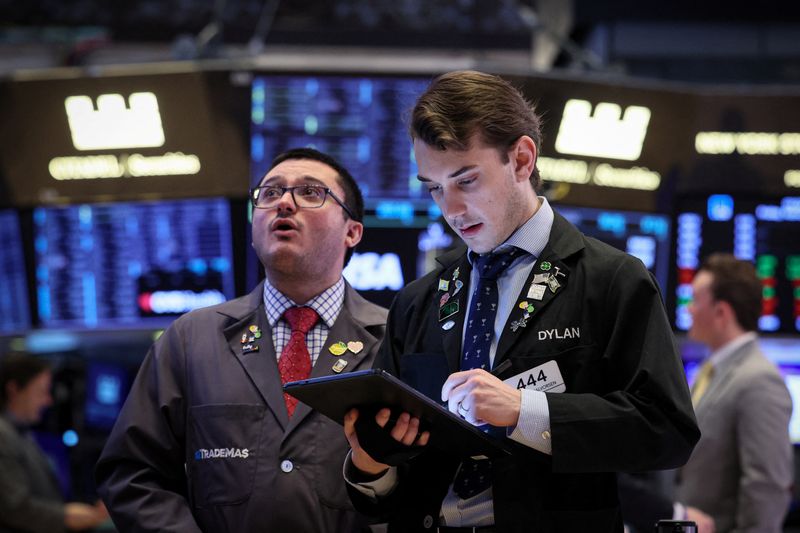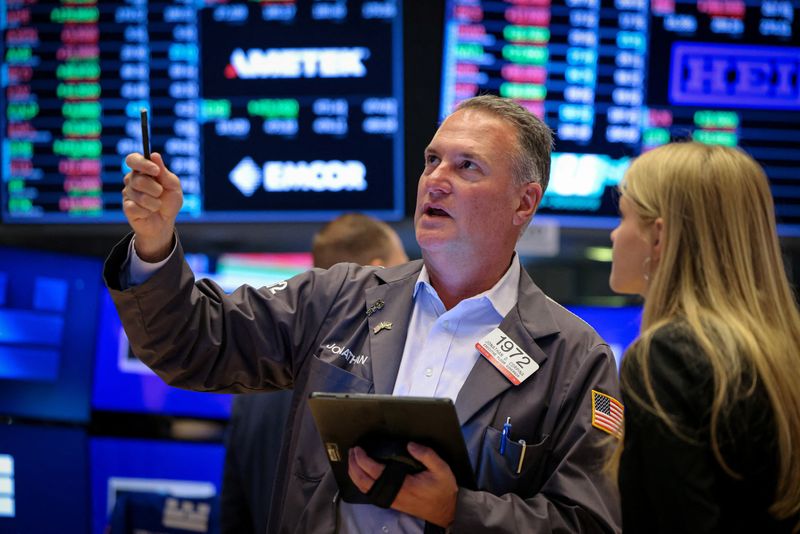Select Language

The non-release of official U.S. labor market figures because of an ongoing federal government shutdown looms over the new trading week, along with the Supreme Court, which is expected to hear arguments on the legality of sweeping U.S. tariffs. Advanced Micro Devices and Palantir are set to report their latest quarterly returns, while the outcome a Bank of England interest rate decision is somewhat uncertain.
1. U.S. data blackout continues
Attention now turns to the ongoing U.S. government shutdown, which is flirting with becoming the longest such closure in American history.
Crucially, the shutdown has left investors without a range of critical data points needed to suss out the state of the U.S. economy. Although a reading of inflation for September was released late last month, separate key measures of job growth have not been published.
Federal Reserve policymakers have also been left without data normally used to calibrate interest rates, a fact that has contributed to a muddled outlook for borrowing costs over the rest of 2025. Following a 25-basis point drawdown in rates last week, Fed Chair Jerome Powell suggested that officials could become more cautious about further cuts should it face a dearth of job and inflation reports.
The trend could continue this week, depriving markets of the latest nonfarm payrolls report, an all-important gauge of employment in the world’s largest economy that is typically released on the first Friday of every month. A tracker of job openings and labor turnover is also set to be postponed.
Despite a recent raft of consequential events -- most notably, the Fed decision, high-profile mega-cap tech sector earnings, and crunch trade talks between the U.S. and China -- the shutdown has partially left investors without a roadmap for the final two months of the year, analysts at Vital Knowledge said in a note. "[I]n some ways, people are feeling even more confused than before," they added.
On Friday, the Wall Street Journal reported that lawmakers in Washington were making some progress toward a deal to end the shutdown, although President Donald Trump’s demand that Republican senators effectively bypass Democrats in the chamber to reopen the federal government has cast doubt over these discussions.
2. Supreme Court to hear arguments on legality of Trump tariffs
Trump’s sweeping tariff policies could once again come to the forefront this week, when the Supreme Court hears arguments around the legality of the levies.
The case has been brought before the Supreme Court after lower courts ruled that the president had surpassed his authority by employing emergency federal measures to enact the elevated tariffs on a slew of countries.
Whether the court’s 6-3 conservative majority finds in favor of the Republican president’s use of the 1977 International Emergency Economic Powers Act, or IEEPA, is unclear, although the Supreme Court has repeatedly sided with Trump in other key decisions so far this year.
Trump is the first U.S. president to employ IEEPA as legal backing for tariffs, citing a $1.2 trillion U.S. goods trade deficit in 2024 as well as American deaths from the painkiller fentanyl.
Should the tariffs be struck down, Trump would be left without a tool he has utilized in negotiations with foreign nations throughout his second term in office.
3. AMD earnings ahead
On the earnings calendar, Advanced Micro Devices is set to be the latest artificial intelligence chipmaker to report its latest quarterly results following an intense round of AI dealmaking.
According to Reuters, the U.S. Department of Energy created a $1 billion partnership with the semiconductor group last month to construct two supercomputers necessary to address large scientific problems like cancer treatments and national security.
Meanwhile, AMD has said it would supply AI chips to OpenAI as part of a multi-year deal that would both generate billions of dollars in annual revenue and grant the ChatGPT-maker access to about a 10% stake in the firm.
Yet the deal joined a host of similarly-circular arrangements which have fueled concerns around the possible emergence of an AI bubble reminiscent of the dotcom boom in the late 1990s. Such deals have become increasingly more common, driven by the AI industry’s need to fund and expand computing power to meet ever-rising demand for cutting-edge AI models.
Executives at AMD, a major rival to AI-darling Nvidia, said the OpenAI agreement was "certainly transformative" for both the business and the wider AI industry.
Shares of AMD, which is expected to report after the closing bell on Wall Street on Tuesday, have soared by more than 112% so far this year.
4. Palantir to report
Data analytics giant Palantir Technologies is also slated to report this week, with the returns due out after markets close on Monday.
In August, the company, whose operations also involve software for the the defense sector, lifted its full-year revenue forecast for the second time in 2025, citing strong demand for its AI-linked services from both businesses and governments.
A Trump administration focus on bolstering national security, as well as a change in Pentagon purchasing plans toward commercial and "non-traditional" suppliers, has further boosted the group.
Shares of Palantir have more than doubled so far this year, reflecting investor wagers that the firm will be at the forefront of the AI boom and a major beneficiary of increased U.S. spending on defense-related technology.
Palantir is anticipated to post third-quarter operating profit of $255.6 million on revenue of $1.09 billion, according to Bloomberg consensus estimates.
5. Bank of England decision
While last week’s Fed rate cut and European Central Bank and Bank of Japan policy holds were widely anticipated by markets, the Bank of England’s announcement later this week is far from locked in.
Markets are now anticipating that rates will remain unchanged at the BoE this week, although there was still a roughly one-in-three chance that the central bank will ease by a quarter of a percentage point.
Leaving borrowing costs steady would mark the first slowdown in a cycle of policy loosening which began last year. But some analysts now anticipate a potential drawdown because of recently softer-than-expected -- albeit relatively elevated -- consumer price inflation and wage data.
The BoE has consistently slashed rates every three months since August last year, yet Governor Andrew Bailey said in September that the path ahead is "more uncertain."

Wall Street futures were slightly lower on Thursday as investors assessed the Federal Reserve’s remarks, Big Tech earnings, and a newly announced U.S.–China trade deal.
The Fed delivered the expected quarter‑point cut on Wednesday, but flagged gaps in official data amid the federal shutdown, which could impact its future decisions. Chair Jerome Powell said policymakers may turn more cautious if jobs and inflation data stay scarce.
Powell’s comments prompted traders to unwind some bets on another similar-sized move at the Fed’s December meeting to about 70% from 90% earlier this week.
Investors digested a mixed set of Big Tech earnings, with Meta Platforms falling 8.8% in premarket trading and Microsoft slipping 2.6% on concerns of mounting spending on AI.
The Instagram-parent stunned investors with a near $16 billion one-time charge that gutted its third-quarter profit. It also flagged 2026 capex as "notably larger" next year.
Microsoft cautioned that capital expenditures will increase this year, reversing its earlier forecast of moderation.
In contrast, Alphabet jumped 7.2% after strong AI demand powered better-than-expected quarterly results.
"Megacap earnings and the AI theme should be dominant factors for the S&P 500 and risk assets. It would take a very strong hawkish shift in Fed rate expectations to derail the risk asset rally," said Ryan Wang, U.S. economist at HSBC.
Heavier spending signals from all three companies, combined with stretched valuations and a hawkish Fed tone, have prompted investors to pause after record peaks.
Among other earnings-related moves, Chipotle Mexican Grill tumbled over 19% after the burrito chain axed its annual sales forecast, with tariffs and inflation squeezing margins.
Markets will also turn to upcoming results from other ’Magnificent Seven’ members Apple and Amazon, due later in the day.
Nvidia’s march to the $5 trillion milestone helped Wall Street’s main indexes notch record highs in the previous session before Powell’s comments tempered some rate-cut expectations.
At 06:47 a.m. ET, Dow E-minis were down 153 points, or 0.32%, S&P 500 E-minis were down 5.25 points, or 0.08% and Nasdaq 100 E-minis were down 31 points, or 0.12%.
TRADE DEAL MADE, DETAILS AWAITED
U.S. President Donald Trump claimed a breakthrough with Chinese counterpart Xi Jinping on rare earths and tariffs after a nearly two-hour meeting on Thursday. Trump agreed to roll back some tariffs on Chinese imports in exchange for Beijing resuming soybean purchases, keeping rare earth exports flowing, and cracking down on fentanyl trafficking.
China agreed to pause export controls on rare earths that would last for a year, the country’s commerce ministry said in a statement.
Shares of rare earth miners rose, with MP Materials up 3.3%, USA Rare Earth advancing 4.7% and Critical Metals rising 6.7% in premarket.

Gold prices rose in early U.S. trade on Wednesday as market participants look forward to an expected Federal Reserve rate cut later in the day.
Spot gold edged up 1.8% to $4,024.42 per ounce as of 06:43 ET (10:43 GMT), while U.S. Gold Futures edged down 1.4% to $4,038.01.
The yellow metal slipped sharply in the last two days, reaching its lowest level since early October.
Fed decision on tap; Trump’s Asia visit in focus
The Fed’s two-day policy meeting, which began on Tuesday, is widely anticipated to culminate later in the day with a 25-basis-point rate cut.
While lower interest rates normally support gold, investors are placing particular weight on the forward guidance from policymakers.
If Fed Chair Jerome Powell signals that further cuts may be delayed or inflation remains a concern, higher real yields or a firmer dollar could dampen gold’s appeal.
Gold has been pressured by positive developments in U.S.-China trade. A framework agreement between Beijing and Washington over tariffs and rare-earth export controls has raised hopes of a thaw.
Additionally, U.S. President Donald Trump said he expects to cut the 20 % tariff on Chinese imports tied to fentanyl precursor chemicals ahead of his scheduled summit with Xi Jinping in South Korea on Thursday.
After a visit to Tokyo, Trump arrived in South Korea on Wednesday for a summit in Gyeongju with South Korean President Lee Jae‑Myung.
These signals of easing trade and geopolitical risk tend to reduce demand for safe-haven assets like gold, contributing to the recent pull-back from record highs.
Metal markets subdued
Other precious and industrial metals were also subdued on Wednesday as investors squared positions ahead of the Fed decision.
Silver Futures edged 2% higher to $48.27 per ounce, while Platinum Futures gained 1.5% to $1,608.65/oz.
U.S. Copper Futures gained 0.9% to $5.22 a pound.

Amazon said on Tuesday it will reduce its corporate workforce by about 14,000 roles, as the tech giant cuts down on operational layers to limit costs amid ballooning investments in artificial intelligence.
The company had about 1.56 million full-time and part-time employees at the end of last year. Amazon’s corporate workforce includes roughly 350,000 employees.
Reuters first reported on Monday that Amazon is planning to cut as many as 30,000 corporate jobs beginning on Tuesday, as the company compensates for over-hiring during the peak demand of the pandemic.
Amazon has been restructuring its workforce across multiple divisions in recent months, with piecemeal job cuts across its books, devices and services unit, as well as its Wondery podcast division.
CEO Andy Jassy said in June growing adoption of generative AI tools would reduce total corporate workforce at the e-commerce giant in the next few years.
Corporations are increasingly using AI to write code for their software and adopting AI agents to automate routine tasks, as they look to save costs and cut reliance on people.

U.S. stock futures rose Monday, extending last week’s rally, as investors cheered growing expectations of a Federal Reserve rate cut and encouraging signs of progress in U.S.-China trade negotiations.
At 05:35 ET (09:35 GMT), Dow Jones Futures traded 300 points, or 0.6%, higher, S&P 500 Futures gained 62 points, or 0.9%, and Nasdaq 100 Futures jumped 345 points, or 1.4%.
All three of the main stock indices posted record closing highs on Friday, fueled by cooler-than-anticipated inflation data, which reinforced expectations that the Fed will opt to slash interest rates at its two-day meeting.
Fed meeting looms; U.S.-China trade talks progress
Investor sentiment strengthened after data last week showed that U.S. consumer prices cooled more than expected in September, reinforcing bets that the Fed will cut rates at its two-day policy meeting concluding on Oct. 29.
The softer inflation print cemented expectations of a 25-basis-point cut, with markets now watching closely for signals on whether the central bank could ease further in the coming months.
"We continue to look for a 25bp rate cut [on Wednesday], with a further 25bp move in December and 50bp of cuts in early 2026," ING analysts said in a recent note.
Adding to the upbeat tone, U.S. and Chinese officials reached a “framework understanding” on key trade issues over the weekend at the ASEAN Summit in Kuala Lumpur.
Treasury Secretary Scott Bessent said both sides had agreed to defer fresh tariff threats and pause China’s planned restrictions on rare earth exports. The breakthrough sets the stage for U.S. President Donald Trump and Chinese President Xi Jinping to meet later this week to finalize an agreement.
“I think we’re going to have a deal with China,” Trump told reporters on Sunday.
Li Chenggang, China’s lead negotiator, said a "preliminary consensus" had been notched following a round of "candid and in-depth discussions."
Investors took these comments as signs that months of tariff tensions may finally ease, a development that has buoyed risk assets globally.
Big tech earnings in focus
Elsewhere, investors will also focus on corporate earnings, with five of the so-called “Magnificent Seven” tech giants set to report this week.
Microsoft (NASDAQ:MSFT), Meta Platforms (NASDAQ:META), and Alphabet (NASDAQ:GOOGL) are due to release results on Wednesday, followed by Apple (NASDAQ:AAPL) and Amazon (NASDAQ:AMZN) on Thursday.
Investors will be watching for updates on AI investment, cloud demand, and consumer spending trends.
Keurig Dr Pepper (NASDAQ:KDP) starts this week’s parade of high-profile corporate earnings reports, with investors hunting for any fresh guidance from the beverage group, especially after rivals PepsiCo (NASDAQ:PEP) and Coca-Cola (NYSE:KO) forecast a benefit to revenue and income from a weaker dollar.
Crude and gold retreat
Oil prices slipped lower Monday, handing back some of the previous week’s strong gains as traders cheered signs of progress in U.S.-China trade talks, lifting worries about a major fallout between the two largest economies in the world.
Brent futures dropped 0.8% to $64.69 a barrel and U.S. West Texas Intermediate crude futures fell 0.8% to $61.02 a barrel.
Crude prices soared last week after the U.S. imposed fresh restrictions on Russia’s oil industry, this time targeting the country’s biggest oil firms.
Gold prices also fell Monday, extending losses from last week as easing U.S.-China trade tensions eroded bullion’s safe-haven demand.
Spot gold slipped 2% to $4,030.89 per ounce and U.S. gold futures declined 2.3% to $4,044.14/oz.
The precious metal snapped a nine-week winning streak last week as traders took profits following record highs above $4,300/oz which were fueled by geopolitical concerns and expectations of monetary easing.

Gold prices edged lower in Asian trade on Friday, headed for their first weekly decline in 10 weeks, as investors locked in profits after recent record highs and awaited key U.S. inflation data due later in the day.
Spot gold was last down 0.4% at $4,109.55 an ounce by 01:35 ET (05:35 GMT), while U.S. Gold Futures fell 0.5% to $4,123.70.
Gold prices had slumped more than 5% on Tuesday after reaching an all-time high of $4,381.29/oz at the start of the week.
The metal was set to fall more than 3% this week after having rallied for nine straight weeks, driven by expectations of monetary easing and safe-haven demand amid geopolitical tensions.
The pullback reflected profit-taking after bullion hit all-time highs, as well as a shift in sentiment following signs of easing U.S.-China tensions.
US CPI data awaited; Trump-Xi meeting confirmed
The White House on Thursday confirmed that President Donald Trump will meet Chinese President Xi Jinping in South Korea next week, sparking hopes of a thaw in trade relations between the world’s two largest economies.
Traders also turned cautious ahead of the delayed release of the U.S. consumer price index (CPI) for September, a key indicator for the Federal Reserve’s policy outlook.
The data, postponed earlier this month due to an ongoing U.S. government shutdown, is seen as crucial in shaping expectations for the Fed’s meeting next week, where markets are pricing in a 25-basis-point rate cut.
A softer-than-expected CPI reading could reinforce bets on monetary easing and offer support to non-yielding gold, while a hotter print might bolster the dollar and Treasury yields, weighing on bullion prices.
The dollar held firm on Friday, set for a weekly rise, making gold more expensive for buyers holding other currencies.
Despite the week’s losses, analysts said gold’s longer-term outlook remains supported by expectations of lower U.S. rates and persistent geopolitical uncertainty.
Metal markets weak; China’s new 5-yr plan in focus
Other precious and industrial metals were subdued on Friday amid broader caution.
Silver Futures dropped 1% to $48.13 per ounce, while Platinum Futures were steady at $1,594.60/oz.
Benchmark Copper Futures on the London Metal Exchange slipped 0.5% to $10,832.20 a ton, while U.S. Copper Futures gained 0.4% to $5.10 a pound.
China’s Communist Party unveiled a new five-year economic plan that emphasized advanced manufacturing, technological self-reliance, and stronger domestic demand.
The policy framework reinforced optimism that Beijing is committed to sustaining growth through structural reform and innovation.

Gold prices rose nearly 1% in Asian trade on Thursday, regaining some ground after two sessions of sharp declines, as renewed U.S.-China trade tensions lifted safe-haven demand while investors awaited key U.S. inflation data.
Spot Gold was up 0.9% at $4,137.40 an ounce by 06:15 GMT, while U.S. Gold Futures climbed 2% to $4,144.89.
Bullion’s slight rebound comes after slumping more than 5% on Tuesday and extending losses on Wednesday to touch a two-week low of $4,003.39/oz.
The steep fall earlier in the week came as investors took profits following recent highs, encouraged by optimism that trade tensions between Washington and Beijing were easing.
Bullion regains ground as US-China trade tensions resurface
However, sentiment turned on Wednesday after a Reuters report said the Trump administration is considering curbing a broad range of software-powered exports to China in retaliation for Beijing’s latest rare earth export restrictions.
The potential escalation reignited concerns over the U.S.–China trade conflict, boosting gold’s appeal as a safe-haven asset.
In parallel, fresh Western sanctions on Russia added further risk impetus. The U.S. on Wednesday imposed its first Ukraine-related sanctions of this term against Russia’s top oil companies, Rosneft and Lukoil.
The European Union also approved its 19th sanctions package on Moscow, including a ban on Russian liquified natural gas imports and listings of dozens more tankers in its “shadow fleet”.
Meanwhile, the delayed release of the U.S. Consumer Price Index (CPI) for September, now due on Friday due to the prolonged government shutdown, has kept markets on edge.
Investors are watching the data closely for clues on the Federal Reserve’s next policy move, with the central bank’s meeting scheduled for next week.
Expectations that the Fed would cut rates again this month and once again later this year have lent some support to bullion. Lower rates reduce the opportunity cost of holding non-yielding assets like gold.
Other metals also rebound; Silver leads gains
Other precious and industrial metals also rebounded on Thursday as a largely steady U.S. dollar provided support.
Silver Futures jumped 2% to $48.632 per ounce, while Platinum Futures climbed 1% to $1,593.60/oz.
Benchmark Copper Futures on the London Metal Exchange rose 0.4% to $10,712.20 a ton, while U.S. Copper Futures also gained 0.4% to $5.03 a pound.

U.S. stock futures hover just above the flatline ahead of a fresh slate of quarterly earnings. Netflix shares drop by more than 6% in after-hours dealmaking, as traders flag a lower-than-anticipated third-quarter operating margin at the streaming company. Tesla is scheduled to report its latest returns following the closing bell, while luxury bag maker Hermes hints at improvement in demand at its key Chinese market and bargain-hunting helps spur a rebound in gold prices.
1. Futures subdued
U.S. stock futures were muted on Wednesday, with investors digesting a slew of corporate earnings and eyeing the aftermath of an abrupt fall in gold.
By 03:39 ET (07:39 GMT), the Dow futures contract had inched up by 38 points, or 0.1%, S&P 500 futures had ticked higher by 10 points, or 0.1%, and Nasdaq 100 futures were mostly unchanged.
The main averages on Wall Street notched a mixed close on Tuesday. Growing concerns over elevated stock valuations and the questions it raises around a recent rally in equities loomed large.
Geopolitical uncertainty captured much attention as well. President Donald Trump suggested that a much-anticipated meeting with Chinese counterpart Xi Jinping in South Korea later this month may not happen, denting otherwise upbeat hopes around a potential easing in renewed trade tensions between the world’s two biggest economies. However, Trump said that, should the meeting end up taking place, it would be "very successful," adding that he expects to secure a "fantastic" and "fair" trade agreement with Xi.
At the same time, a possible summit between Trump and Russia’s Vladimir Putin was put on hold after Russian officials reportedly indicated that there was no intention to end an ongoing war in Ukraine.
2. Netflix margins pressured by Brazil tax battle
Shares of Netflix sank in extended hours trading, weighed down by a third-quarter operating margin from the streaming giant which missed Wall Street expectations.
At 28%, the company’s margin was just short of forecasts, due largely to charges related to a spat with tax authorities in Brazil. Absent the expense, the margin would have beat estimates, Netflix said.
The Brazilian issue is also seen hitting full-year margins. Netflix slashed its annual outlook for the figure to 29% from 30%.
Still, revenue and profit for the period grew, powered by the firm’s best-ever quarter for advertising sales, along with a jump in membership and higher prices.
3. Tesla to report
A parade of corporate returns marches on later today, highlighted by the release of numbers from electric vehicle titan Tesla after the close of U.S. markets.
The company unveiled record third-quarter deliveries earlier this month, fueled by a marketing and discounting campaign aimed at boosting sales prior to the withdrawal of a $7,500 U.S. tax credit for EV buyers. Worries have, in turn, swirled around how Tesla’s performance will be impacted following the expiration of the tax credits.
However, as analysts at Vital Knowledge said, "earnings reports for this company are nearly irrelevant as the bulk of the narrative and equity value isn’t related to the core business of manufacturing and selling autos but instead hope and hype for products that won’t impact income statement in a material way for years to come."
CEO Elon Musk and Tesla have long touted the benefits of initiatives like robotaxis and full self-driving technology.
Tesla’s stock price has surged by more than 16% so far this year, bolstered in part by its board’s proposal of a massive new pay package for Musk, who has also purchased more shares.
Elsewhere on the earnings docket, telecoms group AT&T, electric services name GE Vernova, and biotech firm Thermo Fisher are set to report before the opening bell on Wall Street.
4. Hermes underlines slight improvement in China demand
Meanwhile, in Europe, Paris-listed shares of Hermes inched higher in early trading on a slight sales improvement at the Birkin bag maker’s key Chinese market in the third quarter.
Hermes CFO Eric de Halgouet said the stronger returns in the country were reflective of a stabilization in property prices in large cities as well as positive stock market trends.
China is one of the most crucial regions for the luxury industry. A protracted real estate crisis and a sluggish economic recovery have dented demand for high-end goods in recent quarters, although Hermes’ announcement, coupled with comments from peers like L’Oreal and LVMH, suggests a sense of guarded optimism in the sector.
Group-wide quarterly sales at Hermes, known for its pricey leather goods such as Constance and Kelly bags, increased by 9.6% to 3.88 billion euros. Analysts ahad anticipated 10% growth, according to Visible Alpha estimates cited by Reuters.
5. Gold volatile
Gold prices slumped on Wednesday, extending a dramatic sell-off despite an earlier recovery wave.
Attention was also turning to key U.S. inflation data due later in the week, which could factor into how the Federal Reserve approaches the trajectory of interest rates in the coming months. It may also be one of the only updated official economic indicators the central bank receives before its next gathering on October 28-29, due to an ongoing federal government shutdown that has delayed a series of key data releases.
Spot gold was down 2.1% at $4,039.48 per ounce as of 07:07 ET. U.S. gold futures fell 1.4% to $4,050.64/oz.
The yellow metal slumped more than 5% on Tuesday, marking its steepest one-day decline since 2020, in a bout of heavy volatility in bullion. Prices had surged to record highs earlier this week, buoyed by geopolitical concerns and expectations of U.S. monetary easing.

Gold prices slipped from record highs in Asian trading on Tuesday, pressured by profit-taking and signs of easing U.S.–China trade tensions that dampened demand for the metal’s safe-haven appeal.
Spot gold was last down 0.8% at $4,322.95 an ounce by 02:27 ET (06:27 GMT), retreating from Monday’s all-time high of $4,381.21/oz as investors locked in gains following a week-long rally.
U.S. Gold Futures for December fell 0.5% 4,339.35/oz.
Gold slips amid signs on easing trade tensions; US CPI awaited
The pullback came as U.S. President Donald Trump struck a conciliatory tone on trade, saying he expected a “strong and fair” deal with China, aiming constructive exchanges with President Xi Jinping at a summit in South Korea next week.
U.S. Treasury Secretary Scott Bessent is expected to meet Chinese Vice Premier He Lifeng in Malaysia later this week, following renewed strained relations. Trump has threatened to impose additional 100% tariffs on Chinese goods starting Nov. 1.
Adding to the shifting sentiment, White House economic adviser Kevin Hassett said on Monday that the prolonged U.S. government shutdown was “likely to end this week,” with negotiators nearing a bipartisan funding deal.
The easing of political uncertainty, alongside trade optimism, reduced the urgency for investors to hold defensive assets like gold.
Meanwhile, attention remains fixed on the delayed U.S. Consumer Price Index (CPI) data, now due on Friday.
Economists expect headline inflation to rise around 3.1% year-on-year. A hotter reading could temper expectations for a rate cut at Fed’s October meeting.
Metal markets fall as greenback strengthens
Other precious and industrial metals also traded lower on Tuesday as a slightly stronger greenback made them costlier for overseas buyers.
Silver Futures dropped 1.5% to $50.68 per ounce, while Platinum Futures fell 1.1% to $1,633.60/oz.
Benchmark Copper Futures on the London Metal Exchange edged down 0.2% to $10,666.20 a ton, while U.S. Copper Futures declined 1% to $5.00 a pound.

U.S. stock index futures rose Monday, boosted by hopes for more trade talks with China at the start of a week that includes a slew of big-name earnings reports as well as important inflation data.
At 06:05 ET (10:05 GMT), Dow Jones Futures gained 95 points, or 0.2%, S&P 500 Futures rose 20 points, or 0.3%, and Nasdaq 100 Futures climbed 90 points, or 0.4%.
The main averages all closed higher at the end of last week, after President Donald Trump suggested that his proposed triple-digit tariffs on China were not sustainable, raising hopes that trade tensions between the two largest economies in the world could be smoothed over.
Sentiment lifted by easing U.S.-China tensions
Trump also confirmed that a meeting later this month with Chinese counterpart Xi Jinping in South Korea will go ahead, adding in a television interview that the U.S. is "going to be fine with China."
Treasury Secretary Scott Bessent later said he expects to meet with Chinese Vice Premier He Lifeng this week in a bid to prevent an escalation of the levies. Chinese state news sources noted that He and Bessent held "constructive discussions" and had agreed to conduct fresh trade discussions as soon as possible.
Heightened U.S.-China tensions had battered Wall Street earlier in October, with stock benchmarks falling from record highs after Trump threatened to impose 100% tariffs against China, drawing a sharp rebuke from Beijing.
Data released earlier Monday showed that China’s economy grew slightly more than expected in the third quarter of 2025, but at its slowest pace in a year amid persistent headwinds from rampant disinflation and U.S. trade tensions.
Tesla, Netflix to headline Q3 earnings
Apart from the trade talks, traders will be keeping tabs this week on corporate earnings from a host of major Wall Street companies, with streaming giant Netflix (NASDAQ:NFLX) due on Tuesday and electric vehicle maker Tesla (NASDAQ:TSLA) on Wednesday.
Others, including GE Aerospace (NYSE:GE), Coca-Cola (NYSE:KO), Philip Morris (NYSE:PM), Rtx Corp (NYSE:RTX), General Motors (NYSE:GM), Lockheed Martin (NYSE:LMT) and Texas Instruments (NASDAQ:TXN) will report earnings during the week.
The focus will be squarely on whether corporates have continued to generate profits amid disruptions from trade tariffs and a cooling labor market. Markets are seeking more cues on the U.S. economy as an ongoing government shutdown has delayed the release of several key economic readings.
Major Wall Street banks reported positive third-quarter earnings last week, offering markets some support.
Elsewhere, Apple’s (NASDAQ:AAPL) iPhone 17 series has outperformed its predecessor by 14% during the first 10 days of availability in the United States and China, according to data released Monday by Counterpoint Research.
Amazon (NASDAQ:AMZN) will also be in the spotlight after an outage to the retail giant’s Web Services, the backbone of many sites.
Crude prices slip lower
Oil prices fell Monday, adding to recent losses as escalating U.S.-China trade tensions added to persistent concerns over sluggish demand and a looming supply glut.
Brent futures dropped 0.4% to $61.03 a barrel, and U.S. West Texas Intermediate crude futures fell 0.4% to $56.90 a barrel.
Both benchmarks declined more than 2% last week, marking their third consecutive weekly decline, partly due to the International Energy Agency’s outlook for a growing supply glut in 2026.

